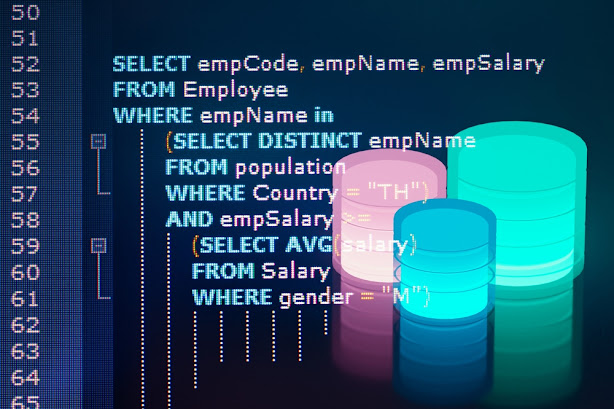Unlock the Power of SQL: Explore the Best Online Courses for Data Analysis
As a data analyst, studying SQL is like getting a treasure map that enables you to easily modify data, discover hidden insights, interface with databases directly, ensure data integrity, communicate successfully, and learn about exciting job options. Read this article to know how to unlock the power of SQL: explore the best SQL online course for data analysis.
Understanding SQL
SQL is a query-based language used to manage, organize, and retrieve archived data from a computer database. The DBMS processes the SQL query, obtains the needed information, and gives it back to us. Instead, SQL statements specify what data should be taken or added to the database, as well as organized.
SQL's Brief History
Dr. Edgar F. "Ted" Codd invented SQL in 1970, as a relational database paradigm.
In 1986, IBM created a relational database prototype that was standardized by ANSI (American National Standards Institute).
Window functionalities, XML-related functionality, and other enhancements were added in 2003.
Various adjustments included XML query language support (2006), better temporal database support (2008), data types, isolation levels, logical operators, syntax, and so on.
The revision names include the year of creation, for example, SQL 2008, SQL 2011, SQL 2016, and so on.

SQL Fundamentals
SQL is a popular query language for managing relational databases such as MySQL Database, Oracle, and others. It is made up of the following sub-languages for performing various operations:
(DDL)Data Definition Language: The commands needed to define the data are included.
(DML)Data Manipulation Language: After obtaining raw data, it must be overseen and transformed into properly structured tables. DML is in charge of this.
(DCL)Data Control Language: Because the data is generated in large quantities and manipulated using simple commands of Data Manipulation Language and Data Description Language, simple operations can be performed on them
(TCL)Transaction Control Language: allowing for the building of relationships with many clients
(DQL)Data Query Language: the required data is displayed to the user while the original and authorised data is stored in a database management system.
Uses of SQL for Data Analysis
Finance: used to manage financial data, such as stock market data, customer account data, and loan information.
Retail: used to manage inventory data, customer purchase data, and sales data.
Healthcare: used to manage patient medical records, insurance claims and clinical trial data.
Logistics: collect shipping data, inventory data, and transportation data.
Manufacturing: manage production data, inventory data, and quality control data.
Telecommunications: manage customer and network data, and call detail records and so on.
SQL Course Syllabus
The syllabus includes:
SQL Fundamentals and DBMS Introduction
Data Engine Installation
SQL Language Syntax
SQL data types
DDL, DML, and DCL in SQL
SQL Functions and Subfunctions
Views in SQL Server
SQL expressions
Indexes in SQL Server and so on.
SQL online course Fee
The course fee for SQL varies depending on the provider, the format, and the level of instruction of the course. However, the average fees for SQL for Data Analysis courses in India are as follows:
Online courses: INR 1,000 to INR 8,000
In-person courses: INR 8,000 to INR 10,000
Self-paced courses: INR 1,000 to INR 3,000
Certification courses: INR 5,000 to INR 20,000
Duration of an SQL course
The duration of an SQL for data analysis course can vary depending on the provider, the format, and the level of instruction.
Online courses: 10-15 hours long.
In-person courses: weeks or months.
Self-paced courses: complete the course at your own pace.
Certification courses: several months or a year to complete.
Salary after SQL course
An SQL Developer's basic salary in India ranges from INR 5 LPA to INR 6 LPA. The range, however, is between INR 2 LPA and INR 11 LPA.
SQL Specialist Salary is determined by the following factors:
Experience
Company Requirements
Understanding of various operating systems
Analytical and Problem-Solving Capabilities
Teamwork and so on.
If you simply want to learn this valuable skill for a career in data analysis, then an SQL course is a great place to start.

SQL Developer Course by Henry Harvin
Ratings
9.9/10
Call/WhatsApp
+91 9891953953
Duration
16-hrs online training.
Fees
INR7500 or EMI of INR833/month
Henry Harvin® is one of the Top 30 Most Reliable Companies, according to Insight Success. Received the Top Corporate Training Award and the Game-Based Learning Company of the Under 40 Business World Award.
A recognised member of the Project Management Institute (PMI), the American Association of EFL, the Ministry of Corporate Affairs, the MSME, the UKAF, the UKCert, and the ISO 29990:201
Benefits of Henry Harvin
Become an accredited SQL developer
Videos of the Session(recorded)
Several Sessions with Different Trainers
1 Year Henry Harvin® Coding Academy Gold Membership
Regular Masterclasses
Access to 10+ Free Courses in the Category #Ask Henry
Conclusion
SQL is in demand due to the growing dependence on data in the digital era. SQL is widely utilized in technology, banking, retail, and other various sectors. In order to stay ahead of the curve in your SQL career, embrace technology as it develops with one of the online courses. Great learning!
FAQ's
Q1. Can I enroll in an SQL developer course without any coding knowledge?
Ans. Numerous SQL developer courses require no prior programming knowledge.
Q2. Differentiate between SQL and MySQL?
Ans MySQL is a database management system (DBMS) that implements the SQL language.
Q3. What are the different ways to learn SQL?
Ans There are different ways to learn SQL, including taking a course, reading books, or watching tutorials.


Interesting article!
ReplyDeleteThanks
Unani Plus
Unani Medicine Doctor Consultation in Bangalore